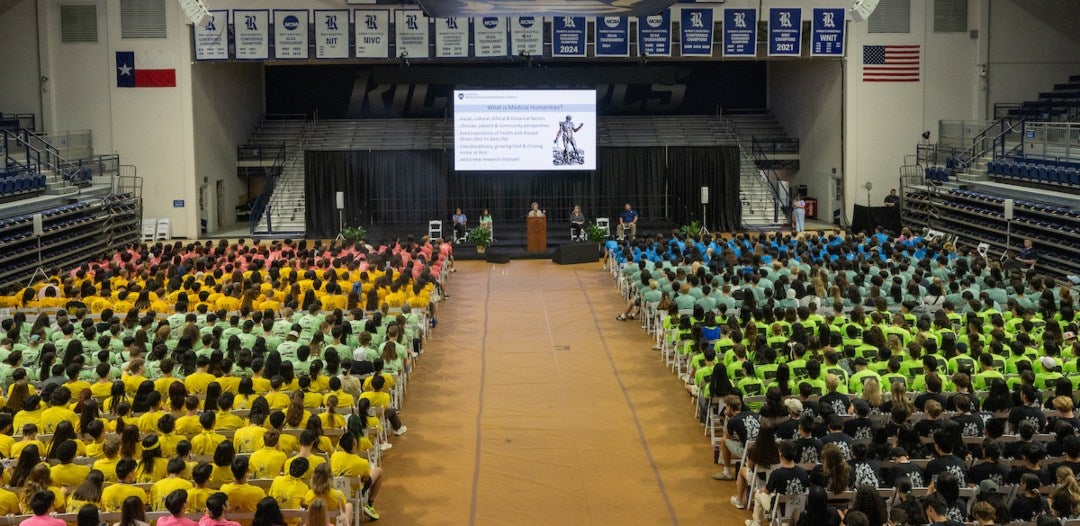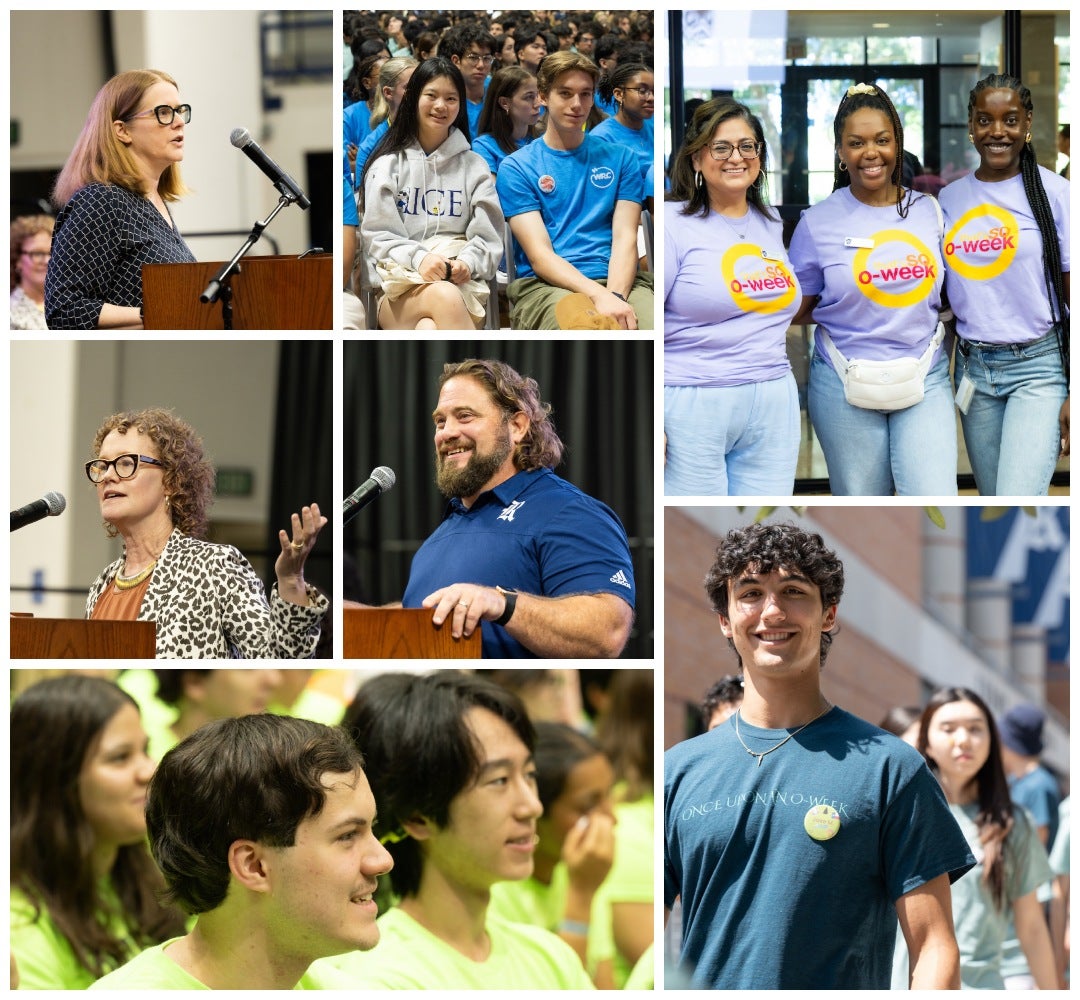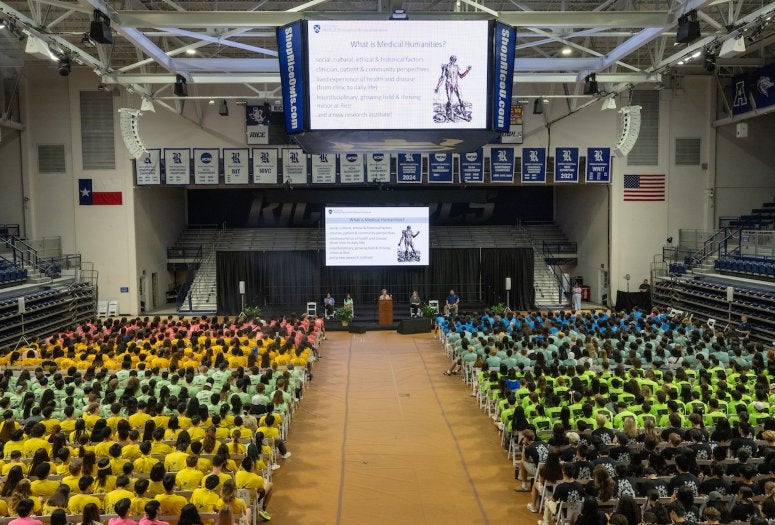
On the second morning of O-Week, Rice University’s Class of 2029 assembled in Tudor Fieldhouse to hear advice from professors who shared their academic experiences as well as secrets for success — both at Rice and beyond. The faculty delivered short, TED Talk-style lectures encouraging new students to explore the possibilities the university offers.
The address served as a precursor to an academic fair as students embark on their collegiate journeys. The event’s main priority is to acknowledge that the next four years serve as an opportunity to learn about topics and fields of study students may not have considered previously, said Bridget Gorman, dean of undergraduates and Trustee Professor of Sociology.
“You are here to do more than select a major in preparation for a career; as faculty, our goals are so much more than that for you,” Gorman said. “Your time with us is designed to help you build strong communication and critical thinking skills, so you can engage with and solve problems across various life circumstances. Learning how to collaborate with others, how to work in diverse teams and developing an appreciation for global issues are mere examples of what we hope you will gain from your time with us. We aim to help you build a foundation of knowledge and skills for lifelong learning.”
Gorman also encouraged the 1,336 new students — Rice’s largest incoming class and one of its most selective — to take advantage of faculty office hours.
“I promise you, the time spent talking with faculty outside of the classroom about the research and creative endeavors is invaluable, and we like it when you come to our office hours,” she said. “We are sitting there waiting for you to do that, so please take advantage of them. Relatedly, you should keep an open space in your schedule, so you can meet and learn from as many faculty as you can.”
Two faculty members representing a snapshot of the university’s nine schools also shared their experiences in academia.

Kirsten Ostherr, the Gladys Louise Fox Professor of English and director of the Medical Humanities program and Rice’s Medical Humanities Research Institute, spoke about the difference between practicing medicine and practicing medical humanities, especially considering the burgeoning use of artificial intelligence (AI).
“Science alone cannot solve our most pressing social, cultural and ethical problems in health,” Ostherr said, referencing the use of AI in medical transcription and its potential in leading to an incorrect diagnosis and suboptimal treatment.
“Some doctors have actually pointed out the thing that we really need to remember is that these tools can extract data, but they may never truly understand the nuances of a patient’s lived experience, and that’s what we need human-to-human contact for,” she said. “[Experts] are advising to have certain kinds of guardrails on this tool, yet it’s clear that it has many potential applications in health care that could be really beneficial. The question we want to ask is, ‘As our world becomes more technological, could AI help to recenter the human dimensions of care? Is it possible that technology will in some way enable a closer connection?’”
James DeNicco, associate teaching professor of economics and director of the Principles of Economics program, spoke of scholarship and his personal journey in higher education.
“I actually gave up a tenure track offer to come here to be a nontenure track professor; they simply made me an offer I couldn’t refuse,” DeNicco said. “It really is one of the best decisions that I’ve ever made, but it certainly changed the trajectory of my career. Instead of [researching] applied macroeconomics, now I was looking for the best ways and trying to develop the best tools to teach the principles of economics.”
He mentioned three major goals he accomplished to become a better teacher: He published a textbook, developed a precollege course in coordination with the company Kaplan and Rice’s Susanne M. Glasscock School of Continuing Studies and created a three course Coursera specialization.
He detailed his meandering path leading from odd jobs into education, and he issued a call to action for the Class of 2029.
“In my life, I’ve been a car cleaner,” said DeNicco, who didn’t start working on his doctorate until the age of 29. “I’ve been a pool boy. I’ve been a grass cutter. I’ve been a short order cook. I’ve been a bartender. I’ve been a bouncer. I’ve been an engineer, and I’ve been a United States Marine. Not your typical resume for a college professor, right?
“I’m going to give you a little quote from one of my favorite movies, ‘Rocky IV.’ ‘If I can change and you can change, everybody can change.’ And if I can do it, I know you can do it, especially if we do it together. Look to your left and look to your right and put it in your mind: No classmate left behind. Let’s do it together.”

After a full day, both incoming graduate and undergraduate students were invited for a chance to meet President Reginald DesRoches and enjoy a catered barbecue dinner in the heart of campus – the Academic Quadrangle. They also enjoyed playing games and collecting swag, accompanied by performances by the Marching Owl Band, an appearance by the cheer team and a special visit from Sammy the Owl.
While the weather forced the party to close early, not even the rain could dampen students’ spirit and enthusiasm to finally start their Rice experience.
Sydnee Peterson, a freshman from Dallas planning to major in biosciences, described her experience so far during O-Week with excitement.
“It is super fun, very energetic and very welcoming, especially if you don’t know anyone,” Peterson said. “The O-Week advisers put a lot of effort into making sure they know everyone’s name before you get here, and it’s honestly really nice.
“Rice is very diverse, and I feel like there’s a place here for everyone. It’s been really fun and easy to start getting to know people, because I feel like I fit in great here.”
Students are encouraged to document their O-Week experience online by including #RiceOWeek2025 on their social media posts.
Be sure to check out the photos from O-Week by clicking here. Students might find themselves, new friends or special moments captured of their colleges.

